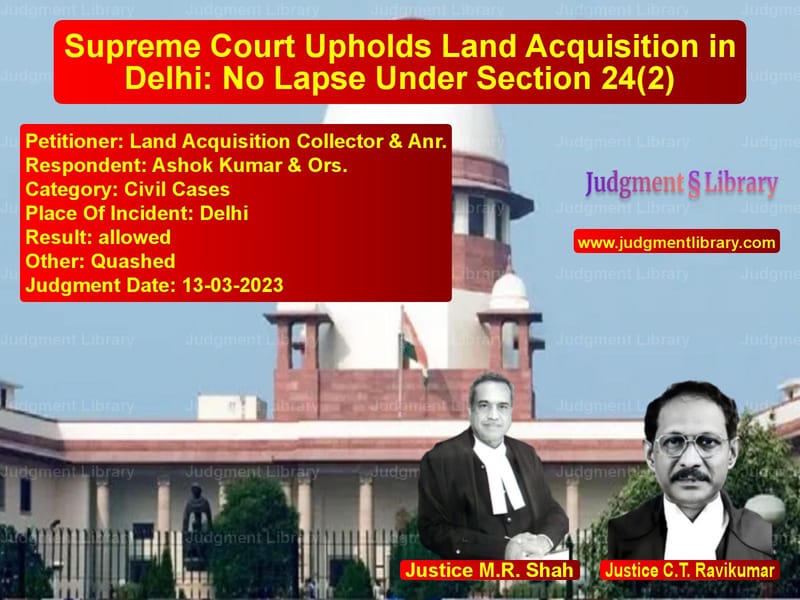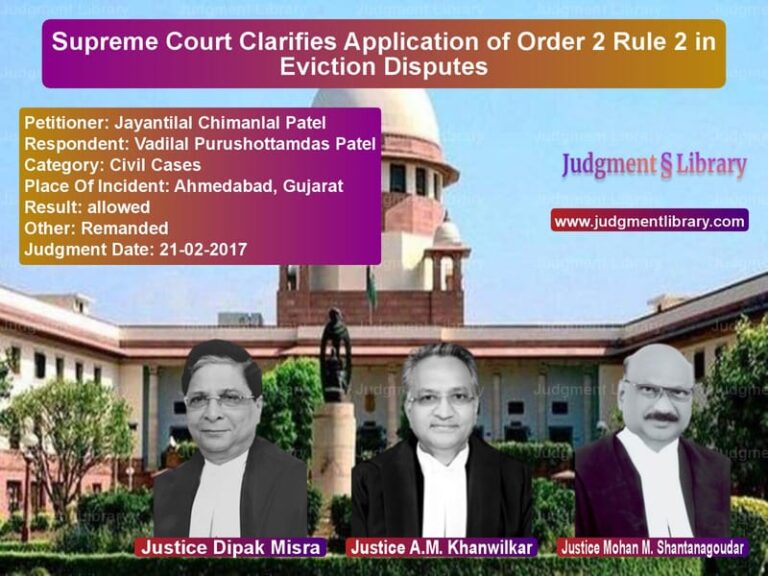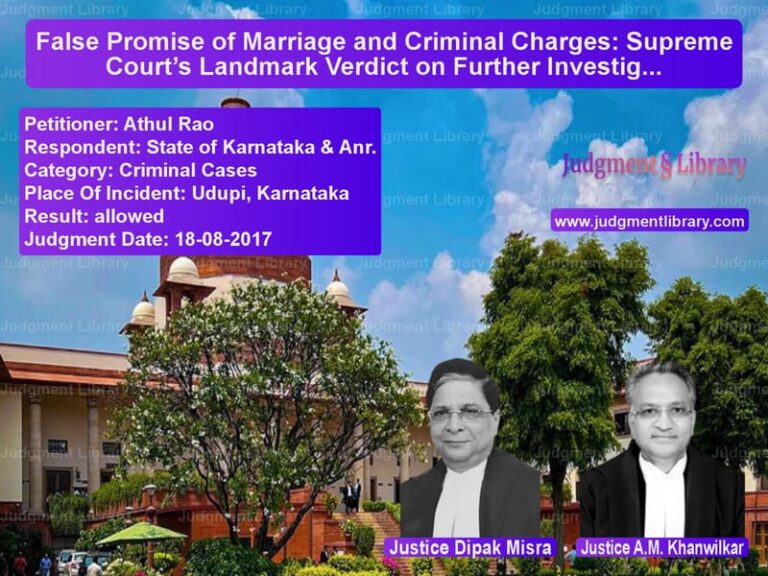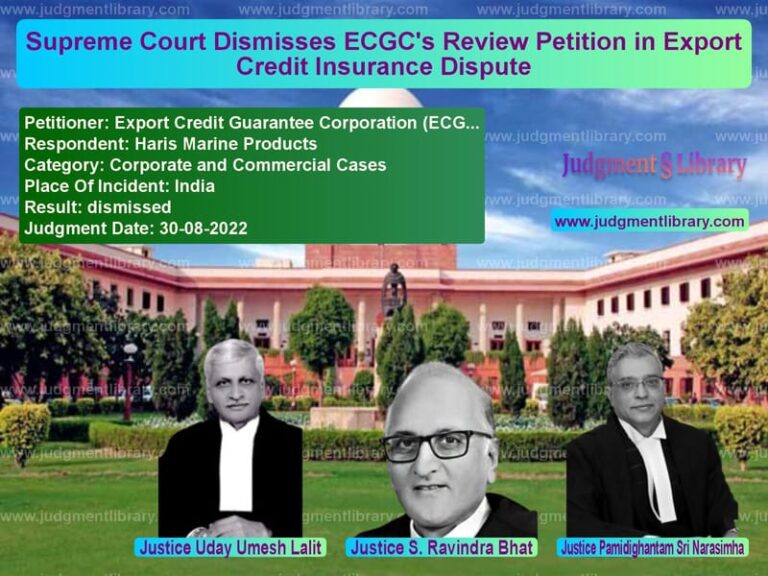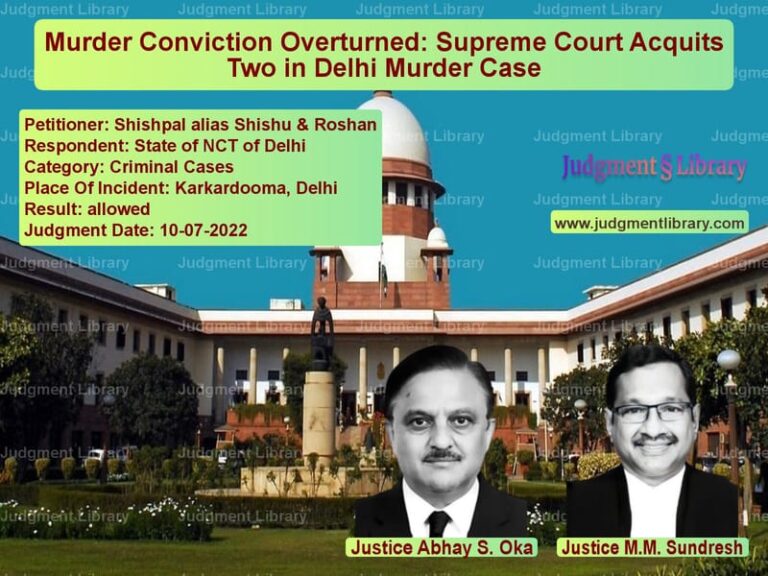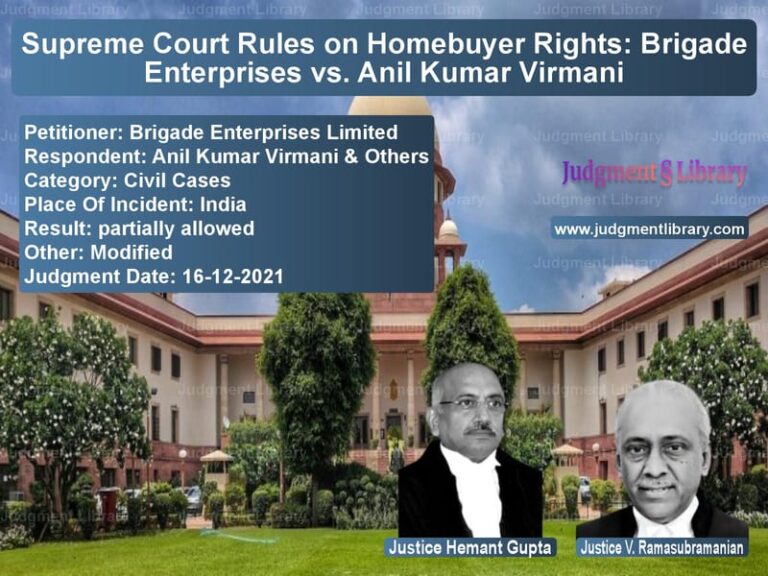Supreme Court Upholds Land Acquisition in Delhi: No Lapse Under Section 24(2)
The Supreme Court in the case of Land Acquisition Collector & Anr. v. Ashok Kumar & Ors. delivered a crucial judgment regarding land acquisition proceedings under the Right to Fair Compensation and Transparency in Land Acquisition, Rehabilitation and Resettlement Act, 2013. The primary issue before the Court was whether the acquisition of a particular land in Delhi had lapsed due to non-possession and non-payment of compensation as per Section 24(2) of the 2013 Act.
The Supreme Court overturned the Delhi High Court’s judgment, ruling that the acquisition had not lapsed since possession was delayed due to a court-ordered stay. The decision aligns with the precedent set in Indore Development Authority v. Manoharlal, reinforcing that acquisition does not lapse if authorities are prevented from taking possession due to legal constraints.
Background of the Case
The case arose from a land acquisition in Delhi, where the Land Acquisition Collector initiated proceedings under the Land Acquisition Act, 1894. The Delhi High Court ruled in favor of the landowners, declaring that the acquisition had lapsed due to non-possession and non-payment of compensation, citing the Supreme Court’s earlier ruling in Pune Municipal Corporation v. Harakchand Misirimal Solanki.
Read also: https://judgmentlibrary.com/supreme-court-rules-against-lapse-of-land-acquisition-under-section-242/
The government appealed against this decision, arguing that possession could not be taken due to a stay order from the High Court, which remained in force until January 1, 2014, when the 2013 Act came into effect.
Arguments by the Parties
Arguments by the Appellant (Land Acquisition Collector & Anr.)
- The acquisition process was legally initiated and completed under the 1894 Act.
- Possession could not be taken due to a court-imposed stay, and such delays should not be held against the authorities.
- Compensation had been deposited, and the refusal of landowners to accept it should not result in the lapse of acquisition.
- The High Court erroneously relied on Pune Municipal Corporation, which had been overruled by the Constitution Bench in Indore Development Authority.
Arguments by the Respondents (Ashok Kumar & Ors.)
- The landowners argued that they never received compensation, which, as per Section 24(2), should render the acquisition void.
- The authorities failed to take possession, indicating an incomplete acquisition.
- The High Court was justified in holding that the acquisition lapsed under the 2013 Act.
Supreme Court’s Legal Analysis
Revisiting Indore Development Authority Precedent
The Supreme Court emphasized that the decision in Pune Municipal Corporation had been explicitly overruled by the Constitution Bench in Indore Development Authority. The ruling clarified:
“The deemed lapse of acquisition under Section 24(2) occurs only when possession has not been taken and compensation has not been paid due to inaction by authorities for five years or more before the commencement of the 2013 Act.”
Stay Orders and Possession
The Court held that possession could not be taken due to legal constraints and that this should not penalize the authorities:
“If possession could not be taken due to a subsisting stay order, then the period covered by the stay must be excluded from the five-year calculation under Section 24(2).”
Compensation Deposits and Landowner Conduct
The Court reaffirmed that compensation is considered ‘paid’ when deposited in a government account, even if the landowner refuses to accept it:
“A landowner who refuses to accept compensation or seeks reference for higher compensation cannot claim that acquisition has lapsed under Section 24(2).”
Final Judgment
The Supreme Court ruled:
- The High Court’s judgment was quashed.
- The acquisition proceedings were upheld as valid.
- The writ petition filed by the landowners in the High Court was dismissed.
- The government’s appeal was allowed.
Impact of the Judgment
- Clarity in Land Acquisition Laws: The ruling ensures that legal constraints do not hinder land acquisition proceedings.
- Prevention of Unjust Claims: Landowners cannot exploit delays caused by stay orders to claim lapse of acquisition.
- Legal Certainty for Development Projects: The decision facilitates smoother implementation of infrastructure projects.
Conclusion
The Supreme Court’s ruling in Land Acquisition Collector v. Ashok Kumar ensures that land acquisition laws are applied consistently and fairly. By rejecting the High Court’s erroneous interpretation, the judgment reinforces the principle that authorities should not be penalized for delays beyond their control. This decision will have lasting implications on pending land acquisition disputes.
Petitioner Name: Land Acquisition Collector & Anr..Respondent Name: Ashok Kumar & Ors..Judgment By: Justice M.R. Shah, Justice C.T. Ravikumar.Place Of Incident: Delhi.Judgment Date: 13-03-2023.
Don’t miss out on the full details! Download the complete judgment in PDF format below and gain valuable insights instantly!
Download Judgment: land-acquisition-col-vs-ashok-kumar-&-ors.-supreme-court-of-india-judgment-dated-13-03-2023.pdf
Directly Download Judgment: Directly download this Judgment
See all petitions in Property Disputes
See all petitions in Landlord-Tenant Disputes
See all petitions in Judgment by Mukeshkumar Rasikbhai Shah
See all petitions in Judgment by C.T. Ravikumar
See all petitions in allowed
See all petitions in Quashed
See all petitions in supreme court of India judgments March 2023
See all petitions in 2023 judgments
See all posts in Civil Cases Category
See all allowed petitions in Civil Cases Category
See all Dismissed petitions in Civil Cases Category
See all partially allowed petitions in Civil Cases Category

